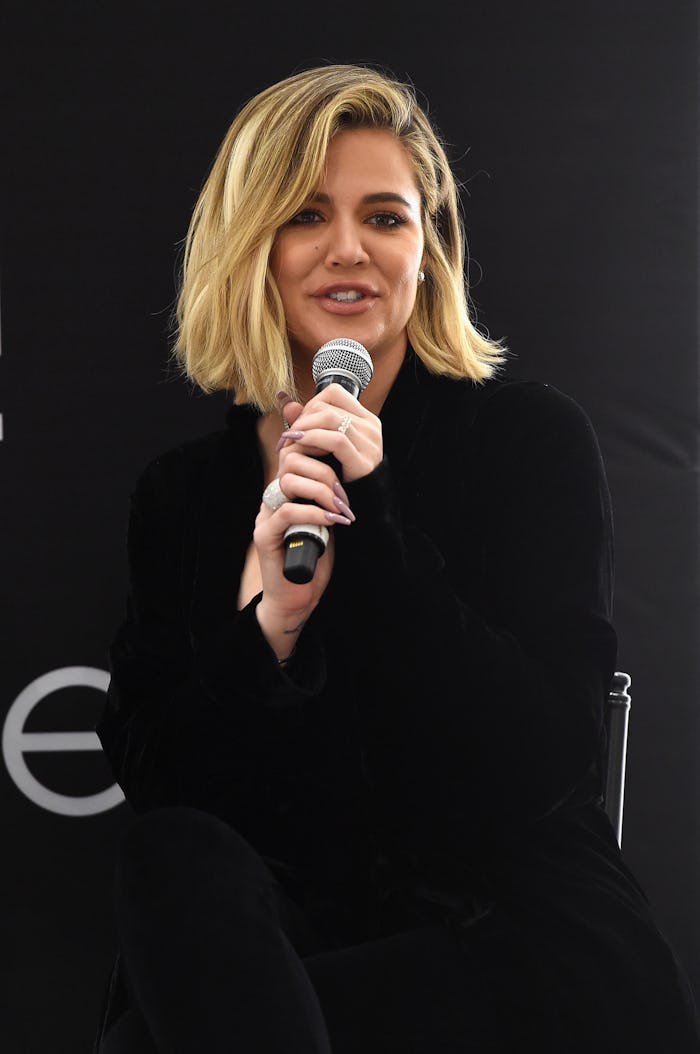Entertainment

Khloé Kardashian Plans To Eat Her Placenta After Giving Birth, & Here's Why
Honestly, placentas are pretty amazing organs. Their sole purpose for existing is to provide babies with crucial, life-sustaining things like oxygen and nutrients, and then as soon they've finished doing their job, they (usually) detach and then they're delivered and all is (usually) right with the world. Yet as much as we might owe them a huge debt for being total gestational MVPs, most women don't give too much thought to their placentas after birth. For some women though, it's different story entirely: Khloé Kardashian plans to eat her placenta after giving birth, according to The New York Daily News, and while that might seem like a strange choice, it's actually pretty popular in Hollywood circles. In fact, Kardashian's sisters, Kim and Kourtney, have both spoken openly in the past about eating their own placentas after giving birth, and it sounds like they're big fans of the practice.
I'll admit that eating my own placenta wasn't ever something I'd even considered doing after my twins were born, but on Sunday's episode of Keeping Up With The Kardashians, the pregnant reality star said she intended to save her placenta after giving birth so that she could eat it in pill form. Proponents of placenta consumption — aka placentophagy — believe that eating your placenta after birth can help milk production and lower the risk of of postpartum depression. And while there isn't much in the way of actual medical research to support that claim, many women who do choose to down their placenta postpartum seem to be pretty happy with that choice.
In 2015, after giving birth to her second son, Saint, Kim Kardashian wrote about eating her placenta in a post on her blog, according to Us Weekly, and explained that she first gave it a try after giving birth to North in an effort to ward of the baby blues. Kim wrote,
I heard so many stories when I was pregnant with North of moms who never ate their placenta with their first baby and then had postpartum depression, but then when they took the pills with their second baby, they did not suffer from depression! So I thought, why not try it? What do I have to lose?
The mom-of-three explained that she'd opted to have her placenta "freeze-dried and made into a pill form," and wrote, "[I] thought I can't go wrong with taking a pill made of my own hormones — made by me, for me." And for someone who started out as a bit of a skeptic, Kim now seems to be a big believer. She wrote,
I had great results and felt so energized and didn't have any signs of depression! I definitely had to do it again. Every time I take a pill, I feel a surge of energy and feel really healthy and good. I totally recommend it for anyone considering it!
That enthusiasm seemed to rub off on big sis, Kourtney, who also raved about eating her placenta after giving birth to her son, Reign, in Dec. 2014. A month after his birth, Kourtney posted a photo of her own placenta pills on Instagram, and wrote, "No joke…I will be sad when my placenta pills run out. They are life changing!"
The Kardashians aren't the only celebs who have consumed their placentas after birth though. January Jones ate her placenta in pill form after giving birth to her son Xander in 2011, as did Alicia Silverston, Mayim Bialik, Holly Madison and Stacy Keibler. But placenta pills also aren't the only option: Girls star Gaby Hoffman told People she made smoothies out of freeze-dried placenta pieces, while one, uh, adventurous dad even wrote an article for The Guardian about his experience cooking up his wife's placenta and eating it "in a taco, fried with a little garlic and paprika." His verdict? He didn't report feeling any different afterward, though he did offer up a pretty gag-inducing comparison: the meal reminded him of "roast brisket and [wasn't] dissimilar to Texas BBQ."
Given her sisters' enthusiasm over placenta encapsulation, it does make sense that Khloé would choose to give it a shot — I mean, if the concept doesn't make you queasy, then who wouldn't want to have more energy after birthing a human? But experts aren't exactly convinced that placenta pills actually make much of a difference: according to Science, two recent studies into the practice of placentophagy found women who ate their placentas had "no significant changes in their moods, energy levels, hormone levels, or in bonding with their new infant" than moms who took a placebo.
In most cases, then, it seems the most likely downside of eating your placenta is that it won't actually do anything. But in some cases, it can also be problematic: in June 2017, the Centers for Disease Control reported that a newborn in Oregon had contracted a group B Streptococcus agalactiae (GBS) infection after birth that was eventually linked to the mother's placenta pill consumption, as the pills tested positive for the bacteria.
Ultimately though, it seems like Khloé certainly isn't the only mom-to-be intrigued by the potential benefits of eating her own placenta, and if she's decided that the pros outweigh the cons (that is, the potential infection risk, and, uh, the major "ick" factor), then more power to her. Being a new mom can be pretty rough, after all, and if placenta pills make her feel better, who is anyone else to judge?
Check out Romper's new video series, Bearing The Motherload, where disagreeing parents from different sides of an issue sit down with a mediator and talk about how to support (and not judge) each other’s parenting perspectives. New episodes air Mondays on Facebook.